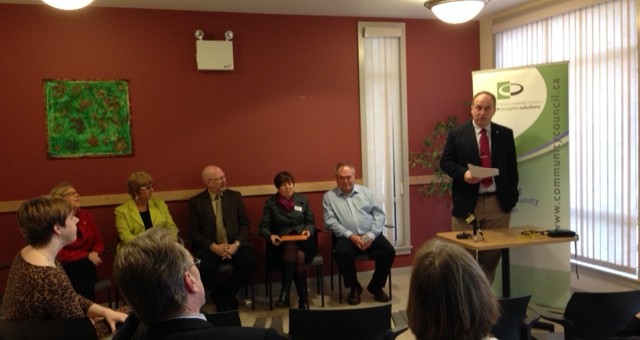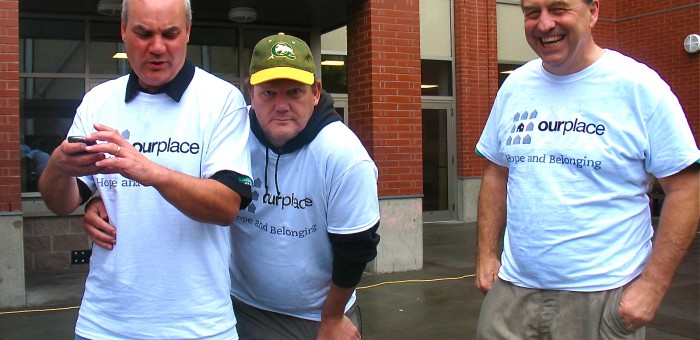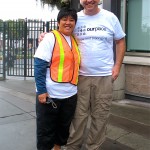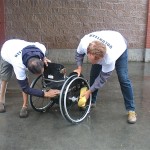Poverty and Homelessness
Reducing Poverty in Greater Victoria
At a press conference held by the Community Social Planning Council in Greater Victoria, a cross partisan group of MPs and MLAs endorsed the Community Action Plan on Poverty and spoke on the need for collaborative policy and action. Building on the vision shared at the Board Voice conference in Vancouver BC, Andrew Weaver spoke of the “opportunity to rethink how we address the social challenges that for years have afflicted British Columbians—our families, friends, neighbours, and ourselves.”
Statement by Andrew Weaver MLA – Community Action Plan on Poverty
“We’re here today in recognition that poverty is systemic within our community. But this is not new. For over a decade British Columbia has had the worst, or second worst, child poverty rate in Canada. The challenge confronting us is: “What can we do collaboratively to help eliminate poverty in our region”.
Each and every person living in Greater Victoria needs to recognize that poverty affects all of us. We need to recognize that working to end poverty is not only the right thing to do from a social perspective. But it is also the right thing to do economically. It simply costs society much more to let our most vulnerable fall through the cracks and end up homeless or on the streets.
How can we not act on the knowledge that thousands of people each year turn to food banks just to get by?
Like you, I believe we have a responsibility as a society to end poverty. Achieving this goal will require an overarching provincial strategy that fosters locally-based solutions. While Carol James and I, local first nations and the rest of you, continue to advocate for the development of that provincial strategy, we must all continue with our work in the community. That’s why we are here today.
The Community Action Plan on Poverty offers a local and grassroots approach to addressing poverty in our community. Its vision and guiding principles are inclusive, supportive and respectful. I am proud to support CAPP and I commit to doing my part as both an individual and as an MLA.
Collaboration and cooperation must be at the root of any successful poverty reduction strategy. I believe that when organizations as diverse as the Community Social Planning Council, the Vancouver Island Health Authority (now rebranded as Island Health), and the Victoria Downtown Public Market Society all work together on initiatives to reduce poverty, it represents a will to accomplish significant results. I truly am proud to support this collaborative action.
I am committed to doing my part to help address the 10 key focus areas identified by CAPP. Let me go further and commit to specifically focusing on three areas: Health, Housing and the development of a Strong Local Economy.
In addressing health within our community, I will continue to speak out on our need to improve access to and the transition from adolescent mental health services. Prevention is a key component of any poverty reduction strategy. Yet at the moment we do not have a coherent and effective system for treating adolescent mental health and as a result, too many of our youth end up falling through the cracks, particularly as they transition to adulthood.
I also plan to continue advocating for further investment into affordable housing, starting with the 2014 budget debate. Investment into affordable housing is sorely needed in the capital regional district where the average rent of a bachelor suite is more than one can obtain from a social assistance cheque.
Finally, I have been and will continue to be a strong proponent of building a dynamic and resilient local economy. As one example, I see the development of the clean-tech sector as an economic, social and environmental strategy that will provide communities with high-paying, stable, and long-term jobs. Developing a resilient, local economy will help provide the foundation for an effective poverty reduction strategy.
These are but three actions that I will commit to taking. But that’s not the end. If you have suggestions of other concrete steps I can take, I encourage you to please let me know. I am excited to be working with you to advance these goals.”
Endorsement of CAPP letter from Andrew Weaver
A Vision for Social and Economic Policy
BoardVoice is dedicated to improving social services to people in their communities. We do this by speaking to government and to our communities about the importance of social services to the health and well being of our citizens, bringing to their attention key concerns and issues, and telling the good news about the work of community based social service agencies.
We promote excellence in governance by connecting board members from across the province and providing resources that assist in developing their boards.
We help build bridges between agencies at the community level to ensure community-wide understanding of how best services should be organized and delivered. Board Voice.ca
On Friday November 22nd, at the Board Voice conference in Vancouver BC, Andrew Weaver, MLA for Oak Bay – Gordon Head provided his thoughts in a keynote speech to delegates.
Board Voice Conference Speech
“We live in a province of opportunity. Not opportunity that is handed to us, but opportunity that we create. We live in an time where the challenges of today are no longer addressed by the solutions of yesterday, and so we are called upon to find new solutions to new challenges—to create new opportunities—so that together we can continue to build a more prosperous, equitable and just society.
We have heard the Liberal government talk of a generational opportunity to develop a liquefied natural gas sector in BC. Today, I would like to propose that we have another generational opportunity in front of us; a generational opportunity to rethink how we address the social challenges that for years have afflicted British Columbians—our families, friends, neighbours, and ourselves.
To do so, we must start by recognizing the reality around us. We are working in a context of budget cuts and core reviews, growing social issues and an economy that is still bouncing back from the 2008 recession. It is a context of limited resources and significant challenges where we do not have the luxury or the resources to address social, environmental or economic issues as if they are isolated siloes — each independent from the other. We have tried this for years, and it does not work.
Addressing these issues in a context of limited resources requires us to move beyond the traditional framework that a social issue is social, and an economic issue is economic.
Instead we are required to find those nexus points that wed the economic, the social and the environmental into a coherent and comprehensive framework for developing our society. Developing these nexus points requires the political will to steer our society in that direction. And that is what I would like to talk to you about today: Nexus points and political will.
What do I mean by this?
Tomorrow morning, you’ll be hearing more about what Alberta’s Social Policy Framework entails and how the Government of Alberta developed this framework. Board Voice is advocating for a similar social policy framework for BC. I believe this is an idea that has merit and deserves attention. But I would challenge us to take it one step further.
As you all know, our ability to fund and implement a social policy framework is contingent on a strong economy that provides the resources to do so. In turn, building a strong economy is contingent on addressing social issues and on the sustainable management of our environment and the resources it affords to us.
There are countless examples of where our attempts to develop the economy have caused significant social or environmental challenges, and vice versa. We need to build a framework that does not simply address social issues alongside the economic development plan, but one that integrates social issues into, and weds them with, economic development and the sustainable management of the environment.
We need to find the nexus points that allow us to move all three aspects forward for the benefit of British Columbia. These nexus points exist, but finding and developing them requires the political will to do so, and therein lies a significant challenge.
How do we create the political will to not simply take the easy way out and focus solely on a single issue, like the economy, but instead to explore those nexus points between the economy, social issues and the environment? This is where, I believe, the Albertan example can offer some guidance.
In creating their social policy framework, the government of Alberta reached out to over 31,000 Albertans in order to get their feedback. This process offered Albertans the opportunity to define Alberta’s social priorities and values in a comprehensive, holistic, and inclusive manner.
As an example, let me highlight two of the social policy goals that were identified as a priority in the framework:
(1) protect the vulnerable, and (2) reduce inequality.
These are goals derived from the people of Alberta, not the government of Alberta, nor Alberta’s governing party. And they are goals that are now being addressed as a part of a comprehensive social policy framework, because Albertans had the opportunity to raise their priorities thereby generating a social license and building political will.
The large-scale public consultation was a critical aspect of creating a social license and building political will. We could and should do the same in British Columbia.
I believe the rationale for having such a framework also exists in British Columbia. In particular let me draw your attention to the three central reasons for the implementation of Alberta’s Social Policy. Paraphrasing, they were:
(1) to clarify the priorities and goals of Albertans and how roles and responsibilities should be allocated,
(2) to coordinate and harmonize activities between government divisions and also with other stakeholders while also ensuring that there is policy alignment and consistency, and
(3) to provide overall direction and focus to planning and decision-making.
To be sure, the Albertan example is not perfect. There was criticism of both the public consultation and the framework itself and the Albertan context is quite different from the British Columbian context. But nonetheless, let’s consider these goals in the context of British Columbia and let’s do that through the lens of a specific issue: adolescent mental health care.
We have a chronically underfunded adolescent mental health care system. In fact, the Representative of Children and Youth does not even consider it a system, so much as a patchwork of services. These services are primarily offered by two ministries: the Ministry of Children and Family Development and the Ministry of Health.
The problem is, because they are offered by two ministries with insufficient coordination of care, many young people experiencing mental health issues, and their families, struggle to navigate the services and find the support they need. Effective coordination and harmonization of services is lacking and that reality is having a negative impact on our ability to deal with adolescent mental health problems.
This situation has both social and economic consequences. Socially, it means that many people in need of care are not getting the care they deserve. The significant distress and impact this lack of care has on the individual is impossible to put a number to, but sadly we all know from recent cases, just how far it can go.
Economically, mental health problems and illness are estimated to cost our province more than $6 billion each year through service costs and lost productivity. This amount does not include costs related to the criminal justice, education or child welfare systems. The longer we put off effectively treating mental health care issues, the more we suffer the long-term economic consequences of our inaction. Better coordination and harmonization of services—through a comprehensive framework—could allow for more effective allocation of public resources, making economic sense, and for more effective treatment, making social sense.
Taking this further, right now the Liberal government is administering what they call a core review. Their goal is to use public resources more efficiently by eliminating unnecessary spending. Yet issues such as better coordination and harmonization of services and long-term planning that would see the better treatment of mental health as both a smart social, and a smart economical, choice are not being fully considered.
They are not being fully considered, in part, because we see mental health as a social issue—one that is secondary to the government’s primary economic agenda. We have siloed mental health into the social realm and have failed to see that, in its essence, adolescent mental health is also an economic issue and that developing a strong economy also requires that we address what we have traditionally seen to be simply social challenges.
We need to change that. We need to build the political will for a triple-bottom-line understanding of these issues—one that looks for those nexus points and uses them to move our province forward.
Although it remains to be seen how effective the Alberta example will be, I do think there is value to considering their approach. In fact, I believe the public consultation process that Alberta ran could also serve British Columbia as we consider our own framework. It could help us define for our own government, what our priorities as citizens are and what their priorities as a government should be.
Yet, I would challenge us all to see this not simply as an opportunity to address the social challenges of our time, but also as an opportunity to create a more holistic vision for British Columbia, generated by the people of this province, and predicated on triple-bottom line priorities and finding key nexus points of interaction.
Addressing social issues, building a strong economy, and sustainably managing our environmental resources—these are significant and interconnected societal challenges that must be dealt with as such. And creating the political will to see these issues as interconnected and address them in that way is our challenge.
I believe meeting this challenge will require us to transcend partisan politics and go to the root of what matters to British Columbians. An independent, public consultation offers us the opportunity to accurately reflect the true values and priorities of British Columbians without the interference of partisan politics. And it ultimately builds the social license required to implement the resulting policies.
Thank you very much for your time and for affording me the opportunity to speak.”
Andrew Weaver – MLA for Oak Bay – Gordon Head
Supporting Our Place
Andrew joined over 80 community leaders, volunteers and generous donors at Our Place September 7 for a car wash fundraiser. This event raised over $2,000.00 to support the important work done by Our Place Society. Tours of the facility were given while local, provincial and federal politicians joined members of the Victoria Police, Firefighters, local media and community groups to wash cars for this great cause.
Our Place is a community service provider in Victoria, where transitional housing, nutritious meals and many supportive programs are offered in a safe and dignified environment for vulnerable citizens in our region. Our thanks and appreciation to City of Victoria Councillor Charlayne Thornton-Joe for organizing this event.




















